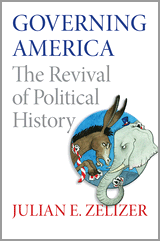 Governing America examines how the interpretations of American political history changed over time and looks at a broad range of issues from the rise of the welfare state to modern conservatism. The book takes the wider view that political historians have more to offer than mere retrospective commentary, rather they aid the public’s understanding of politics today. Eleanor Thompson finds this volume exhilarating and reveals to political scientists the worth of history, beyond furnishing the raw data for political analysis.
Governing America examines how the interpretations of American political history changed over time and looks at a broad range of issues from the rise of the welfare state to modern conservatism. The book takes the wider view that political historians have more to offer than mere retrospective commentary, rather they aid the public’s understanding of politics today. Eleanor Thompson finds this volume exhilarating and reveals to political scientists the worth of history, beyond furnishing the raw data for political analysis.

Governing America: The Revival of Political History. Julian E. Zelizer. Princeton University Press. March 2012.
Happily, “it is now possible to write about the field of American political history without focusing on a crisis that grips this area of scholarship” (p.90). Julian E. Zelizer, Professor of History and Public Affairs at Princeton University, is one of the political historians who has transformed the discipline in recent years. In this collection of essays, he singlehandedly and powerfully demonstrates “the revival of political history”.
In the opening chapters, Zelizer surveys the historiography from the late nineteenth century to the present day, reflecting on how interpretations have changed over time. In so doing, he charts the rise and fall of American political history in the liberal presidential synthesis of the 1950s and 1960s, its surprising perseverance during the doldrums of the 1970s, its capture by political scientists in the 1980s and its triumphant return to the forefront of the American historical profession in the 1990s. Whilst revelling in the diversity of today’s field, Zelizer suggests how multiple interpretations of American political history complement, rather than contradict one another. After all, he observes, “historians, who tend to relish multicausal explanations of the past, should be excited, rather than fearful, about the tensions between competing approaches” (p.32). In this way, Zelizer has himself moved easily between subfields and disciplines in his career to date, not challenging, but collaborating with other scholars. The subsequent essays in the volume make evident his own success in the subfields of policy history, Congressional reform and diplomatic history, whilst demonstrating the possibilities inherent in the practice of the “new political history”.
Zelizer then moves decisively beyond the liberal presidential synthesis, by asking how taxes and budgets have constrained policymakers. In a series of essays published in the late 1990s, Zelizer charts the emergence of a deficit-based state from the New Deal to the present day, forged by the clash of the American people’s rising expectations of federal benefits and their continued hostility to federal taxation. Thus the difficulties of raising revenue were, and remain, as significant a constraint on liberal state-building as American capitalism or racism. Zelizer insists that American political development was, and continues to be, shaped by fiscal constraint, a conclusion reached at a time when the nation enjoyed record budget surpluses, is of course vindicated by today’s financial crisis. Whilst some scholars have struggled to reconcile the Tea Party with their own liberal interpretation of American political history, Zelizer’s observation that “democracy has sometimes been at odds with state-building as it comes into conflict with strong anti-tax sentiment” places it firmly, however uncomfortably, in the mainstream of American politics (p.108).
By analysing the historical development of Social Security and Medicare, Zelizer suggested that today’s policymakers should acknowledge the conflict between state-building and fiscal conservatism and learn from the likes of Wilbur Mills, Democrat and later Chairman on the House Ways and Means Committee, in attempting to reconcile these two impulses inherent in the American political tradition.
Following his work on tax policy, Zelizer shifted his attention to another apparently arcane and technical aspect of American politics, but again demonstrated its broad importance for understanding the nation’s historical development. Zelizer demonstrates how his research on the inner workings of Congress led him to ask how changes in the political process defined historical eras. In this way, he moved beyond political historians’ traditional focus on the presidency and embraced political scientists’ concern with how institutions shape political culture. For example, whilst historians were charting the rise of modern conservatism outside of the main institutions of the liberal state, Zelizer considered how conservatives wrestled with and ultimately appropriated the liberal congressional reforms of the 1960s and 1970s for their own ends. He further considered the coexistence of modern conservatism and activist government in an analysis George W. Bush’s significant expansion of presidential power during his two terms in office.
Finally, in Part IV, Zelizer introduces readers to his most recent research in the field of diplomatic history and his efforts to connect policy and politics in foreign affairs. In two essays on the 1970s, he demonstrated how the centre in national security politics was defeated by the rightward shift in electoral politics. Thus Zelizer insists that historians remember what politicians and political scientists have never forgotten – “that elections matter” (p.308).
Princeton University Press has done the revived American political history a service in compiling and republishing these essays, bolstered by a new introduction and a comprehensive index. However, it is a shame that the citations remain in the format in which they originally appeared – shifting between styles from essay to essay. In each case the full references – which are one of the books greatest virtues and pleasures – are relegated to the back of the text.
This exhilarating volume deserves a broad readership. It is first and foremost invaluable to graduate students and historians exploring new approaches to American political history. Secondly, it reveals to political scientists the worth of political history, beyond furnishing the raw data for political analysis. Thirdly, it suggests ways in which public historians and policymakers might collaborate in policymaking. Finally, the essays are accessible enough to appeal to the general reader interested in the historical development of modern American politics. Above all, Zelizer’s work exemplifies and validates historians’ rediscovery of the importance of American politics, albeit more broadly defined than before, as well as vindicates political scientists’ recent and continued interest in American history.
——————————————————————
Eleanor Thompson recently completed her doctorate in the intellectual history of the New Deal era, is presently teaching twentieth century United States History at the University of Leicester. Read more reviews by Eleanor.








1 Comments